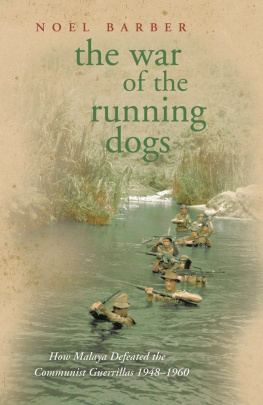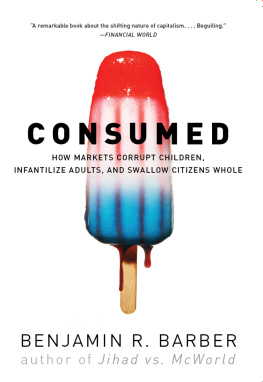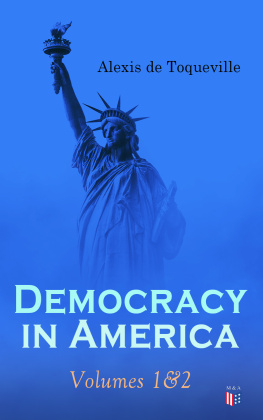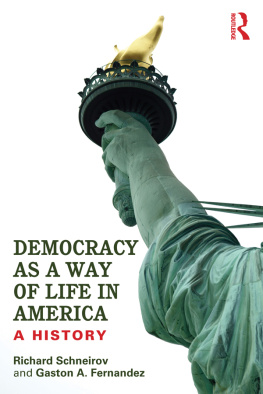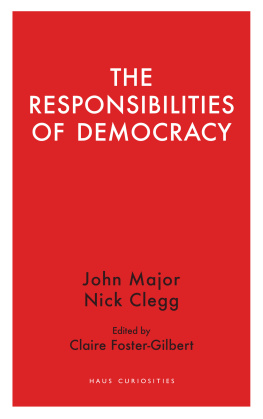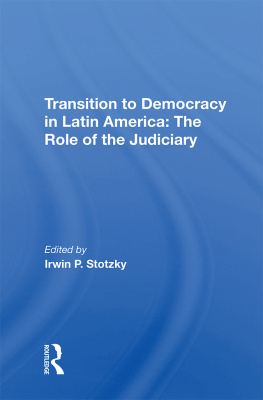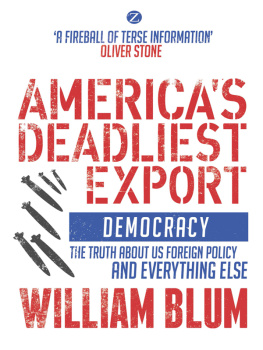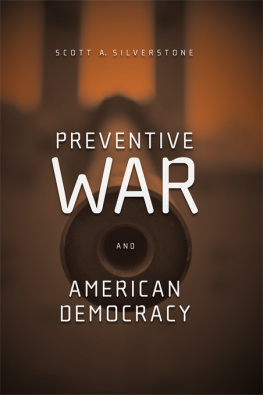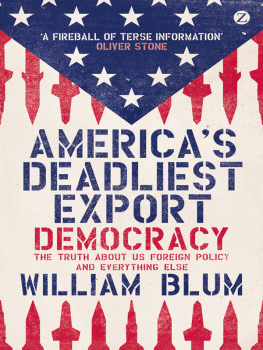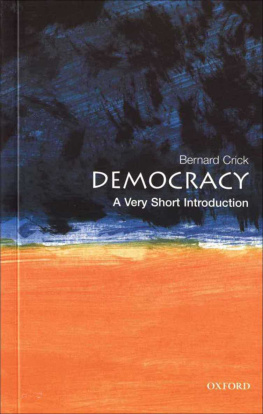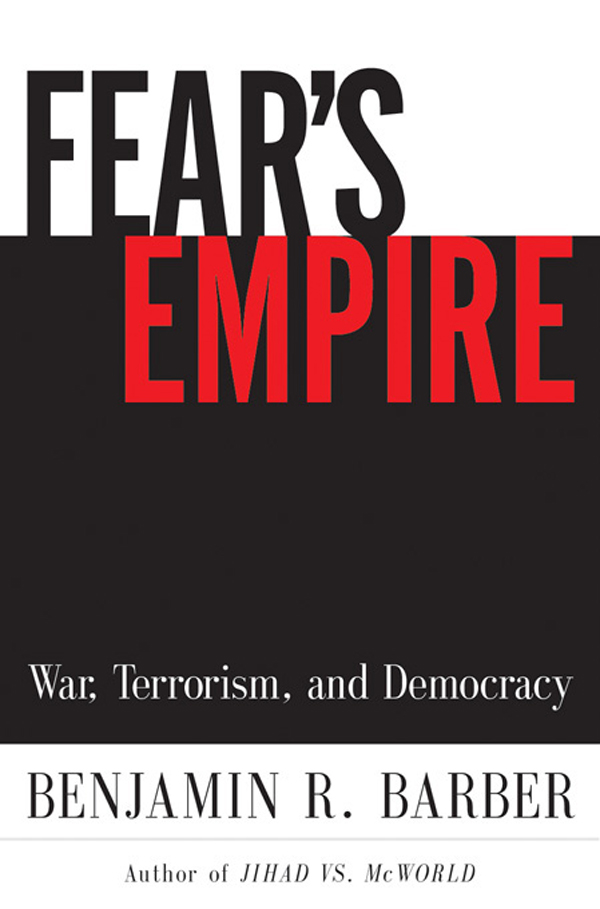
ALSO BY BENJAMIN R. BARBER
The Truth of Power (2001)
A Place for Us (1998)
A Passion for Democracy: American Essays (1998)
Jihad vs. McWorld (2002)
An Aristocracy of Everyone (1992)
The Conquest of Politics (1988)
Strong Democracy (2004)
Marriage Voices (A Novel) (1981)
Liberating Feminism (1975)
The Death of Communal Liberty (1974)
Superman and Common Men (1971)
IN COLLABORATION
The Struggle for Democracy
with Patrick Watson (1989)
The Artist and Political Vision
edited with M. McGrath (1982)
Totalitarianism in Perspective
with C. J. Friedrich and M. Curtis (1969)
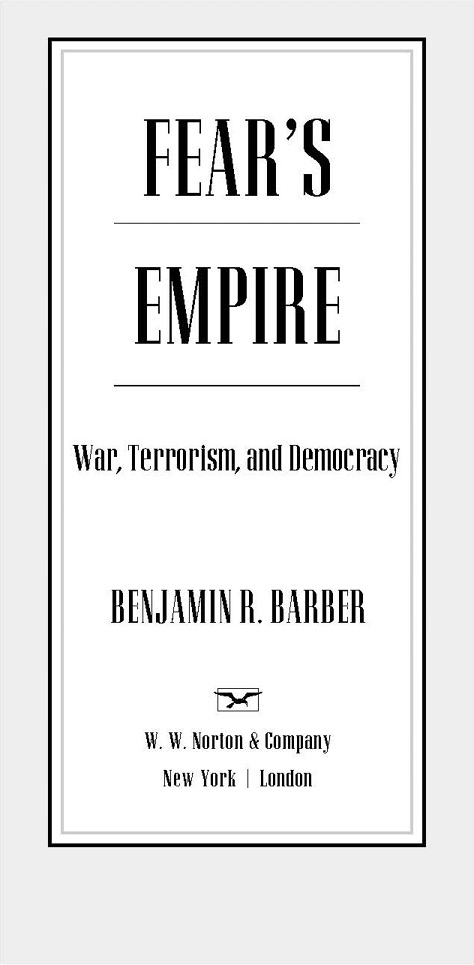
To Willson Barber
brother, friend, artist, citizen
Never, never, never believe any war will be smooth and easy, or that anyone who embarks on the strange voyage can measure the tides and hurricanes he will encounter. The statesman who yields to war fever must realize that once the signal is given, he is no longer the master of policy but the slave of unforeseeable and uncontrollable events.
Winston Churchill,
My Early Life
Woe unto them that are wise in their own eyes, and
prudent in their own sight!...
I also will choose their delusions, and
will bring their fears upon them.
Isaiah 5:21, 66:4
Contents
Acknowledgments
THIS BOOK WAS written over a lifetimeand in a great hurry. I studied national security policy as a graduate student in the early 1960s and have remained a student of international affairs throughout my career as a political theorist, and much of what I have learned over this lifetime has found its way into these pages. But the rollout of a new preventive war strategy after 9/11 leading to wars in Afghanistan and Iraq, and the prospect of preemptive moves by an American administration possibly bent on shock and awe in Iran, North Korea, and other hostile regimes in the near future, impelled me in the fall of 2002 to embark on a fast-track writing schedule. Because of the very short time I had to write, I am especially grateful for the help I received from my personal research assistant, Josh Karant, whose diligent library and Internet research provided empirical, historical, and bibliographical details of paramount importance. Karant also gave me the benefit of his judgment on substance. I was helped too by the invaluable work of my executive assistant, Katie Roman, and key members of the Democracy Collaborative staffabove all Jill Samuels, Sondra Myers, and Michele Demers. I am very pleased to have completed the work as a principal of the new Democracy Collaborative and among my new colleagues at the University of Maryland. As with my earlier book published by W. W. Norton, my work has benefited by the sharp editorial eye and sound judgment of my editor Alane Mason, and from the dexterously wielded blue pencil of copyeditor Don Rifkin.
Finally, this book represents the written expression of a political commitment to international law and global democracy that is embodied in CivWorld, the citizens campaign for global democracy (www.civworld.org) with which I feel privileged to be involved. Both the book and the campaign reflect my hope that America will give up its futile attempt to meet fear with fear.
I WRITE IN the spirit of Katharine Lee Bates, who composed the lyrics for America the Beautiful, and in her poem England to America authored this prophetic stanza:
And what of thee, O Lincolns Land? What gloom
Is darkening above the Sunset Sea?
Vowed Champion of Liberty, deplume
Thy war-crest, bow thy knee,
Before God answer thee.
Preface to the Paperback Edition
S ix weary GIs, their arms outstretched, raise Old Glory over a Pacific island called Iwo Jima. A little girl, her face a mask of terror, flees from a rice paddy napalm blast. Jeering Somalis drag a battered body, stripped of its U.S. uniform, across the desert floor. A simple stirring picture tells wars epic story in a snapshot. The Heroic Generations World War II. Quagmire Vietnam. The fiasco of Somalia. But for the arrogant futility of preventive war and the self-defeating self-delusion of President Bushs Afghan and Iraqi misadventures, one photo is not enough.
Recall two, from the spring of 04: One, flaunting the horror of American body parts swinging from a Fallujah bridge asgreater horror stillsupposed allies and friends of America exult. And the second, a grisly set of digital pictures, just a couple of weeks later, displaying all those hooded and naked Iraqi prisoners at Abu Ghraib prison west of Baghdad in postures of degradation and humiliationtheir American captors leering into the camera as if they had just pulled off a clever fraternity prank.
Just a year into what was to be a happy story of liberation vindicated, the preventive war strategy was in tatters. It had unraveled more or less along the lines foretold by skeptics in the media, cautious warriors in the Pentagon, and scholarly Islamics in academia well before President Bush took his coalition of the willing roaring into Iraq in quest of nonexistent weapons of mass destruction and the head of Saddam Hussein. The pictures, read aright, rehearse lessons taught by the ancient tragedians: that war, no less than peace, must always be approached with humility and a full sense of the intractability of human affairs; and that hubris is forever its own undoing.
The photos throw into relief this books key puzzle: exactly why, although America has twice won campaigns against rogue states, those very successes constitute failures in the war on terrorism. Why is the democratic United States being decisively defeated in the struggle to win hearts and minds in the world of Islam, on which the outcome of the long-term struggle for democracy will hinge? The answer that emerges: it is impossible to liberate people at the barrel of a gun. Generous intentions cannot redeem imprudent policies and costly consequences.
A year after the invasion of Iraq and several years into the adventure called preventive war, all the evidence suggests that President Bushs strategy has failed. There will be no easy transition to democracy in Baghdad with bordering countries falling like dominoes in a neat democratic row; there will be no permanent pacification of Afghanistan even if Osama is finally caught; there will be no Pax Americana military solution to disorder and tyranny in the nondemocratic world; there will be no gratifying payoff for American goodwill, no kudos for Americas self-described liberators; and there will be no decisive victory in the war against terrorism or the battle for enduring national security. Although it has been advanced under libertys banner, fears empire cannot and will not reign in libertys name.
Yet for the same reasons that America continues to embrace preventive war in theory even as it everywhere fails in practice, it continues to misread last springs raw images, drawing from them the wrong conclusions: that anybody who opposes America in its righteous war on terrorism really is evil incarnate (just look at the evils they perpetrated in Fallujah!); that Americas purposes are truly righteous (just see how aberrant is the behavior of the guards at Abu Ghraib, a few bad apples who do not represent America but are a stain on its righteous honor!). But these are not the lessons to be drawn from the pictures by the observant viewer, not the lessons they yield to anyone who knows something of Americas dialectical history and of democracys complex nature.
Next page




